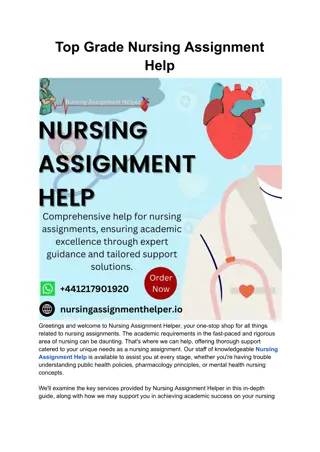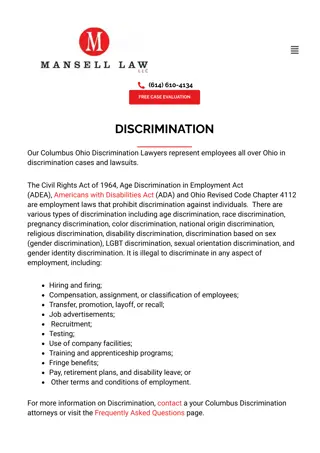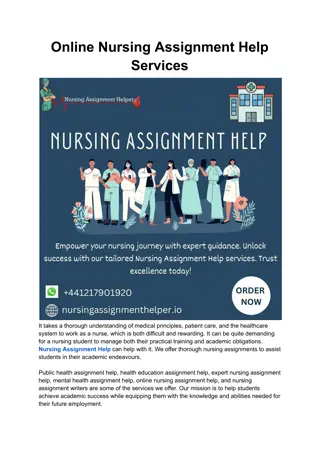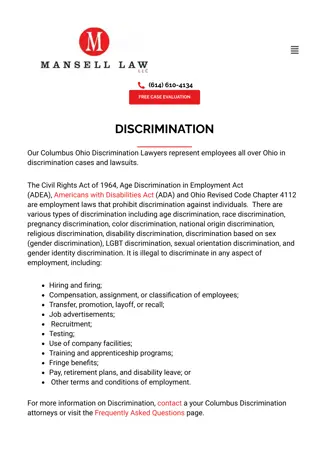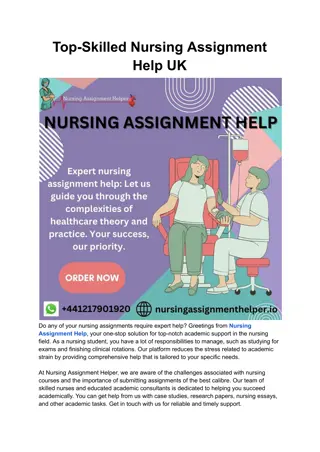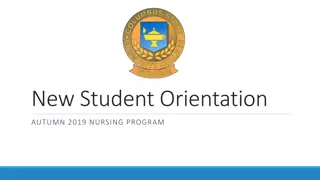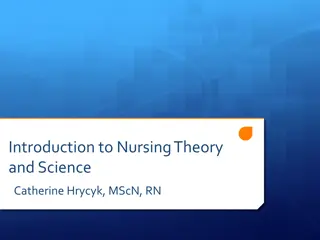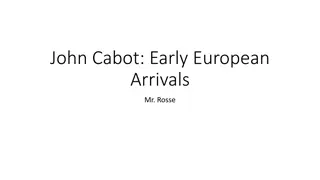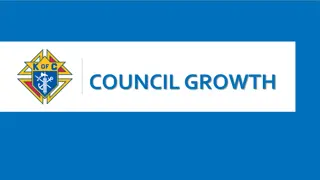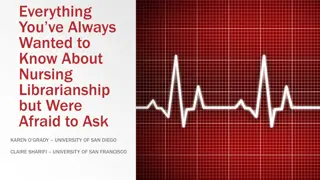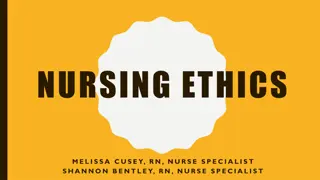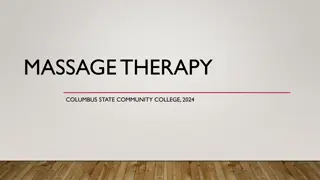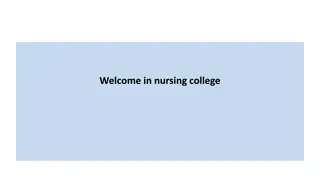Welcome to the Nursing Program at Columbus State Community College
Congratulations on your acceptance to the Nursing Program at Columbus State Community College! The Associate Degree Nursing Program offers a rigorous curriculum supported by faculty and staff to help you succeed. The program outcomes focus on safe and patient-centered care, utilizing evidence-based practices, collaboration, and technology. The Concept-Based Curriculum enhances student understanding by teaching essential nursing concepts. Following the Plan of Study is crucial for success, ensuring you complete the required courses in the correct sequence. Welcome to your journey in the Nursing Program!
- Nursing Program
- Columbus State Community College
- Student Orientation
- Concept-Based Curriculum
- Program Outcomes
Download Presentation

Please find below an Image/Link to download the presentation.
The content on the website is provided AS IS for your information and personal use only. It may not be sold, licensed, or shared on other websites without obtaining consent from the author. Download presentation by click this link. If you encounter any issues during the download, it is possible that the publisher has removed the file from their server.
E N D
Presentation Transcript
New Student Orientation SPRING 2019 NURSING PROGRAM
Welcome Congratulations on your acceptance to the Nursing Program at Columbus State Community College. The Associate Degree Nursing Program is just one of several programs in the Nursing Department, and we are thrilled and honored that you have chosen Columbus State Nursing as the first step of your journey. You will find that despite the rigorous curriculum of the program, we will be there with you every step of the way and are here to help. We wish you nothing but success on your journey throughout our program and after. Welcome to the Nursing Program! Sincerely, Columbus State Nursing Faculty & Staff
Program Outcomes Upon completion of the Associate Degree in Nursing, the graduate will be able to: 1. Implement safe, patient centered care in the professional role of the registered nurse. 2. Utilize nursing judgement supported by best current evidence and quality improvement measures in providing nursing care for patients across the life span. 3. Collaborate effectively with patient, family, nursing, and inter-professional team. 4. Apply informatics and technology to communicate and manage patient care. (AND Program Student Handbook, pg 10)
Concept Based Curriculum Student understanding is improved when students focus on broad concepts that cross environmental settings, the lifespan, health and illness. (Giddens & Wright, 2012) Because of this, and in an attempt to avoid content saturation (increasing/overwhelming quantities of information), the Nursing Department teaches a Concept Based Curriculum. A Concept Based Curriculum works by teaching essential nursing concepts, such as pain or oxygenation , and then relating representative samples of client situations or problems as a way of teaching each concept. The outcome is that the student should be able to grasp and understand the concept, and then apply said concept to patient situations.
Plan of Study Review On the following slide, you will find a breakdown of the Nursing Plan of Study effective Spring 2019. The Nursing Program Sequence includes 16 credit hours of General Education courses, 14 credit hours of Basic Education courses, and 32 credit hours of Technical Education credit hours for a grand total of 62 credit hours. It is extremely important that the plan of study is followed sequentially and precisely. Failure to do so may result in the student falling out of sequence.
Plan of Study Review SP 2019 G/T/B NURS 1140 T 1 NURS 1871 T 6 NURC 1104 B 2 COLS 1100 B 1 MATH 1025 B 3 CR SU 2019 G/T/B BIO 2300 G 4 ENG 1100 G 3 PSY 1100 G 3 STAT 1350 G 3 CR AU 2020 G/T/B NURS 1141 T 1 NURS 1872 T 7 BIO 2301 B 4 CR GRADUATION REQUIREMENTS G = General Education B = Basic Education T= Technical Education Total General Ed 16 Total Basic Ed 14 Total Non Technical 30 Total Technical 32 Total Credit Hours 62 SP 2020 G/T/B NURS 2042 T 1 NURS 2871 T 5 NURS 2872 T 3 PSY 2340 G 3 CR SU 2020 G/T/B CR NO COURSES AU 2020 G/T/B NURS 2873 T 8 BIO 2215 B 4 CR
Review of Nursing Student Handbook It is of utmost importance that students newly admitted to the Nursing Program fully read and understand the entirety of the Associate Degree Nursing Program Student Handbook. You will be expected to be familiar with all policies included in the Associate Degree Nursing Program Student Handbook. All of the information in the handbook is of high relevance, but not all of the information included in the handbook will be addressed in this presentation. Please click the cloud below to view the Associate Degree Nursing Program Student Handbook for Spring 2019. SP19 Nursing Program Student Handbook SP19 Nursing Program Student Handbook
Review of Nursing Student Handbook Code of Conduct: Students are required to display ethical and professional behavior at all times and during all activities (including social media). Students must display moral and ethical responsibility and accountability for their actions and behaviors. Students are required to adhere to the policies and procedures put forth in course syllabi, CSCC ADN Program Student Handbook, CSCC Code of Conduct and any CSCC policies, procedures and requirements in the CSCC Catalog. Students displaying any unethical or unprofessional behaviors are subject to serious disciplinary action by the Nursing Program, the college, the Ohio State Board of Nursing and/or other applicable authorities which may result in dismissal from the program. (ADN Program Student Handbook, pg 17)
Review of Nursing Student Handbook Social Media: Postings on social networking sites may be subject to the same professional and ethical standards as any other personal interactions. Harassment, bullying, and discrimination are prohibited by Columbus State Policy 3-43 and Policy and Procedure 7-10. Complaints or alleged violations of these policies and procedures will be referred to the Office of Equity and Compliance and/or the Office of Student Conduct. (ADN Program Student Handbook, pgs 23-24) All students accepted into the Nursing Program at Columbus State Community College are expected to read and adhere to the National Council of State Boards of Nursing recommendation on A Nurse s Guide to the Use of Social Media . Please click the cloud below to review. A Nurse s Guide to the Use of Social Media by NCSBN A Nurse s Guide to the Use of Social Media by NCSBN
Review of Nursing Student Handbook Examinations: The Nursing Program and Department upholds the highest standard of integrity in regards to testing. Please review and understand all policies and procedures regarding examinations. It is expected all examinations be taken as scheduled on the course calendar. Examinations given in Nursing are generally multiple choice and computer scored. The examination booklet, computer answer sheet, and/or other documentation must be returned to the instructor at the completion of the examination time. The answer response on the computer answer sheet or computer test is considered the official answer response for grading. Exam questions may not be copied by students. Exams are the property of Nursing and are not returned to the students. Students are prohibited from discussing examination information with anyone other than the faculty. (ADN Program Student Handbook, pg 27)
Review of Nursing Student Handbook Attendance: Students are expected to prepare for and attend all course learning activities. Attendance at course orientation and clinical orientation is required. Students who miss either orientation will be dropped from the course. Each course has activities designed to enable students to meet the course objectives that are essential for student learning. Course teaching-learning strategies vary by course and may include live lecture, lecture capture, seminar, lab and clinical. Students are expected to participate and complete all course activities as indicated on the syllabus and calendar. Absences or not completing course activities may result in a lack of success in the course and the Nursing Program. (ADN Program Student Handbook, pg 21) Students late or absent from clinical due to an emergency are required to notify the clinical agency and instructor at least one hour prior to scheduled start time. (ADN Program Student Handbook, pg 22) Class orientation and clinical orientation are mandatory, no questions asked. Failure to attend either will result in dismissal from the course.
Review of Nursing Student Handbook Communication: When communicating with any faculty and/or staff at Columbus State via email, ONLY emails from a Columbus State email address will be addressed. This is a security precaution. Faculty are available during their posted office hours. You may email faculty with question or concerns. Faculty will make every effort to respond within 2 business days. Saturday, Sunday, and holidays are not business days. Please plan for the 2 business day allowance of time as you seek assistance with assignments or questions related to your course.
Review of Nursing Student Handbook Concerns and/or Complaints A student complaint is an expression of dissatisfaction about the nursing program expressed in writing submitted to the Nursing Department Chairperson, and resolution of student complaint is a written response from the Nursing Department Chairperson to the written complaint, outlining activities to address the complaint, if warranted. (ADN Program Student Handbook, pg 30)
Review of Nursing Student Handbook Advising: A nursing faculty advisor is assigned to each Nursing student upon entry to the first semester in Nursing. The advisor is available to assist and advise students regarding academic concerns and nursing career planning. During Autumn 2018, you will be assigned a Nursing faculty advisor. As a student, it is your responsibility to contact your advisor with any questions or concerns pertaining to your progress throughout the Nursing Program. Beginning Monday, November 5, 2018, you will be able to retrieve a document including the name and contact information of your advisor from your student mailbox located in the Nursing office on the fifth floor of Union Hall.
Review of Nursing Student Handbook Nursing Program Technology: Nursing students are required to be knowledgeable with computers. It is advisable for students to own a computer. If the student does not have a computer, CSCC has a Computer Commons located in the Center of Technology and Learning (TL) building, room 116. Students can walk to the front desk, sign their name and a lab assistant will assign them a station. Students are asked to show their college student ID card. The educational Resource Center also has computers for student use. The Nursing Program also has a student computer lab in Union Hall room 429. Students use word processing programs in all courses and need a program installed that is compatible with Microsoft Word. Some courses use Microsoft PowerPoint for presentations, so this software may also be required. The course syllabi will also list course specific computer requirements. Students also have access to CSCC student email and should check their email frequently. The course management system is BlackBoard and instructors use this in many ways to communicate and deliver information. BlackBoard orientation is highly recommended for those with limited exposure. For technical requirements, please click the cloud below. (ADN Program Student Handbook, pg 29) BlackBoard Orientation BlackBoard Orientation
Staff Introduction Staff: Dr. April Martin Interim Chairperson Kathy Eichenberger Program Coordinator Angie Lennon Clinical Coordinator Susan MacDowell Lab Technician Catherine Mohr Specialist Steve Pletcher Simulation Coordinator
Faculty Introduction NURS 1871: o Pat Brown pbrown64@cscc.edu o Dr. Tammy Montgomery tmontgom@cscc.edu NURS 1872: o Ericka Purtee epurtee@cscc.edu o Dr. Tara Rohr trohr1@cscc.edu NURS 2872: o Patty Allen pallen13@cscc.edu o Alison Romanowski aromanowski@cscc.edu o Vickie Warschauer vwarscha@cscc.edu NURS 2871: o Heather Less hless@cscc.edu o Kathy McManamon kmcmanam@cscc.edu NURS 2873: o James Hofe jhofe@cscc.edu o Edna McQuesten emcquest@cscc.edu o Jackie Miller jmiller@cscc.edu Floating Faculty: o Jill Ritchey jritche1@cscc.edu o Kim Stein kstein@cscc.edu o Katelyn Zag kzag@cscc.edu Listed above are the full-time faculty at the heart of the Nursing Program at Columbus State, paired with the courses they lead. These are the same faculty members that will be assigned as your advisors.
Uniforms & Dress Code The Nursing Student Dress Code is extensive. We will cover general points in this presentation, however, we strongly advise you to become familiar with the dress code policy in its entirety, as you will be held accountable for such in lab and clinical. Failure to abide by any dress code policy set forth by Columbus State Community College Nursing Department can result in dismissal from clinical. CSCC Nursing Student Uniform (ADN Program Student Handbook, pg 41-43) CSCC photo identification badge, bandage scissors, hemostat, watch with second hand and stethoscope. Navy blue lab jacket with CSCC nursing student patch is optional, and is the only additional part of the uniform to be worn. No other jackets, sweaters, or coverings may be worn. All white t-shirts may be worn under the uniform. Pregnant students may wear a white maternity uniform top to which a CSCC nursing student patch has been applied and navy blue maternity uniform pants. Uniforms are to be laundered after each clinical day. The CSCC Nursing Student polo shirt is worn in designated clinical areas per faculty instruction. Socks or hosiery are required to be worn with the uniform. Please refer to the Nursing Skills Lab slide for specifics regarding appropriate attire during your lab experiences.
ADN BSN The Columbus State Community College Nursing Program stresses the importance of furthering your education after obtaining an Associate Degree in Nursing. The Nursing Program has partnered with many Colleges and Universities to offer our students a seamless progression towards a Bachelor of Science in Nursing. For more information on pathways, please click the cloud below. You may also contact the Health and Human Services Advising Department, or email Dr. Tara Rohr, Nursing Instructor at trohr1@cscc.edu. Columbus State Community College Preferred Pathways Columbus State Community College Preferred Pathways
Traditional vs. Blended Tracks In order to be successful in the Nursing Program, it is important to understand the differences between the two tracks, and what will be required in each. The content you receive will be the same in both tracks; however, as different teaching and learning strategies are employed, there will be a notable difference in how the content is delivered. The traditional track is strongly structured and requires in-person attendance for all components of the course lecture, seminar, lab and clinical. The blended track is asynchronous. The blended track delivers lecture and seminar assignments online, with the guidance of BlackBoard, and allows students to complete their work on their own time within a certain time frame. For students in the blended track, in-person attendance is still required for lab and clinical components of the course, meaning that in-person attendance is still required a minimum of once per week.
Nursing Skills Lab The Nursing Skills labs are located on the 4th floor of Union Hall in rooms 432 and 435. The Nursing Skills lab is where you will practice and develop new skills discussed in lectures. The labs are managed and organized by Susan MacDowell and Edna McQuesten. Listed below are rules and policies you should familiarize yourself with prior to your first time in lab: No flip flops, open toed shoes or high heels; no low cut shirts; no short skirts or shorts; wear student uniform for competencies. Wear white CSCC nursing student nametag to lab. No food or drink in the skills lab. Wash hands prior to handling mannequins. Leave beds and bedsides neat and clean. Mannequins can be moved carefully by two students. Open lab for practicing skills is available to all students in our program. Open hours are listed on the bulletin board outside UN 432 and on BlackBoard. Cell phones off in lab. No videotaping or photographs allowed in lab. Skills lab is to be used only by CSCC nursing students or nursing faculty and staff. The first week of lab for 1871 will NOT be in the labs. Otherwise come to UN 432 or 435 for scheduled lab. Questions? Contact Edna McQuesten at emcquest@cscc.edu or Susan MacDowell at smacdowe@cscc.edu.
Health Records Office If you have not submitted a previous health record to the Health Records Office, you must complete all items of the Nursing health record available on our website. Incomplete records are not accepted. Your health record must remain up to date to register for clinical courses. It is your responsibility to ensure your health record is complete for each registration period. Health record deadlines are listed on our website. Please make photocopies for your own file prior to submitting your updated documents to the health records office. Please click the cloud below to access the health records website. How to submit a Health Record: You may choose to scan and email your documents in PDF format to healthrecords@cscc.edu Emails will only be accepted from your CSCC student email account (@student.cscc.edu) Photos are not accepted. You may not email to check on the status of your health record. Records can be submitted in person to Union Hall room 132. You may choose to fax your documents to (614)287-5386. Please click the cloud below to access our webpage for additional information, forms and deadlines. Detailed information on health record requirements is available under the Heath Record Fact sheet link. Please choose one mode of submitting your documentation. Submitting duplicate copies will slow down processing times. Records are processed in the order they are received. Completed health records received by the deadline will be processed within 1- 5 business days. Completed health records received after the deadline may be processed within 5-10 business days. Health Records Health Records
CPR Certification The Nursing Office is located on the 5th floor of Union Hall. This is where your student mailboxes are located, as well as where you will drop off your updated CPR certification. In regards to your CPR certification, all students admitted to and continuing in Nursing must meet the following requirements for CPR: The student must be certified for 2 years by the American Heart Association or American Red Cross as BLS for Healthcare Provider. The student must present current CPR certification card or e-Card code to the Nursing Program Specialist. The certification card can be presented in person only. The e-Card code will be accepted via email or in person. No copies or faxes will be accepted. The student is responsible for maintaining current CPR certification throughout the program. In order for a student to register for a clinical nursing course, CPR certification must be current through the end of the last week of classes preceding final exam week of the semester the student is seeking to register. The block on registration will be removed once the student presents a current CPR certification card to the department specialist. If there are questions, please see the department specialist. (ADN Program Student Handbook, pg 13)
NURS 1871 NURS 1871 Fundamental Concepts of Nursing Care will be the first clinical course of the Nursing program. Please take note of the following information pertaining to this course: If you are in the traditional track, you will be expected to attend lecture, seminar and lab for two hours each, per week. Lecture will be held Tuesday s from 8A-10A, seminar will be held Tuesday s from 10A-12P or 12P-2P and lab will be held Wednesday s from 8A-10A, 10A-12P, or 2P-4P. You will also be required to attend four hours of clinical per week. Clinicals are held Monday s from 7A-11A or 3P-7P or on Wednesday s from 7A-11A or 3P-7P. If you are in the blended track, you will be expected to spend a minimum of four hours per week actively engaging in course content and working on online assignments (this does not include study time such as assigned reading). You will spend two hours in lab per week on Wednesday s from 4P-6P, and four hours in clinical per week, on Friday from 7A-11A, Saturday from 7A-11A or Monday from 3P-7P. Students must have uniforms by week one of the program. Students must access BlackBoard prior to the first day of class in order to obtain information pertaining to the first day of class for NURS 1871 (including reading, room assignments, etc.). Important and valuable course information will be available on BlackBoard as soon as it becomes available. Please listen to and review this information prior to the first day of class.
NURS 1871 Students in the traditional track will register for the clinical, lab and seminar when they are registering for NURS 1871. Students in the blended track will register for the clinical and lab when they are registering for NUR 1871. Faculty are NOT able to take personal requests to accommodate work or child care issues. We will try to accommodate issues related to other courses (such as Anatomy or English). PLEASE NOTE: although this information is listed on a slide pertaining to NURS 1871, it applies to all courses throughout the nursing program. Please notify the NURS 1871 course leads if you need to be on the COTA bus route ASAP. Blended track students will have a mandatory orientation on the first Wednesday of Spring 2019 immediately following the 4P-6P lab. Failure to attend the first day of class or the first day of clinical will result in you being withdrawn from the course. If you are not familiar with BlackBoard, please complete the tutorial provided by the college prior to the first day of the course. Please purchase your Evolve package prior to the first day of class, as you will have assignments.
Pharmacology Courses The current Nursing curriculum consists of three pharmacology courses NURS 1140, NURS 1141 and NURS 2042. Please take note of the following information: All three pharmacology courses are web based (all instructional and laboratory sessions are completed in an online setting), regardless of whether you are in the blended or traditional track. All pharmacology tests must be taken in the testing center. You must pass your clinical course in order to move ahead to the next pharmacology course, as the clinical and pharmacology courses are co-requisites. Please refer to the ADN Student Handbook regarding Nursing Program Progression.
NURC 1104 NURC 1104 Basic Care Skills is a co-requisite to NURS 1871. Please take note of the following information: NURC 1104 is a skills-based course. NURC 1104 meets one day per week for four hours in UN 420. The first hour of the course is seminar, paired with a PowerPoint, and the last three hours will consist of lab. You will be assigned a lab coach to assist with skills at the bedside. Your lab coach will stay the same throughout the semester. If you miss a lab, that lab must be made up before you can attend the next class. An open lab schedule will be posted for any make-up or practice. Open lab is for make-up and for practice. Students are expected, and have a responsibility to come to class prepared: Come to class on time. Wear scrubs to class (NOT scrubs that have not been laundered from your last clinical). Look professional (hair tied back, no hats).
NURC 1104 As soon as possible, log onto BlackBoard and familiarize yourself with the tutorials regarding Elsevier and what areas this class will cover regarding Elsevier. Take time to become comfortable with Elsevier and where to find information. The official gradebook will be kept on BlackBoard, not Elsevier.
Elsevier You will be able to purchase the required Elsevier products when the CSCC Bookstore opens two weeks prior to the semester. You must purchase the required Elsevier products. Hard copies of the Elsevier books are available for purchase from Elsevier at an additional cost. Once the Elsevier packages are opened and accessed, the Elsevier product is not returnable or refundable. The link to Elsevier is www.elsevier.evolve.com. You may click the cloud below to access the Elsevier site. Please see the next slide regarding how to access eBooks. Do not open the HESI envelope or access the code until NURS 1871 orientation. We will discuss the HESI Assessment Exams on the first day of class. Save all Elsevier Access Codes and bring them with you to the first day of your NURS 1871 course. Elsevier Evolve Elsevier Evolve
Enter Access Code here
Wrap Up If you have ANY questions about anything in this presentation, please do not hesitate to reach out to the Nursing Department at 614.287.2506 or cmohr3@cscc.edu. We appreciate any feedback. In order to get credit for watching this video, please download, print and sign the Orientation Verification form. You may access the form by clicking the cloud below, or by visiting the Nursing homepage and clicking on the Orientation Spring 2019 link on the right side of the page. Please bring it to the Nursing office on the 5th floor of Union Hall before October 10, 2018. PLEASE NOTE: If you do not turn in this form, you will not receive credit for watching this video, which will disqualify you from beginning the Nursing course sequence in Spring 2019. Orientation Verification Form Orientation Verification Form






